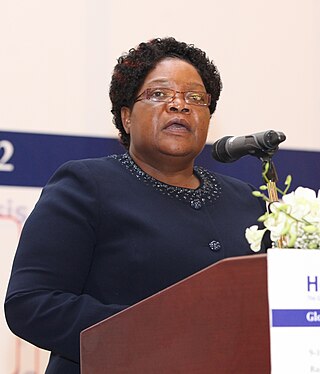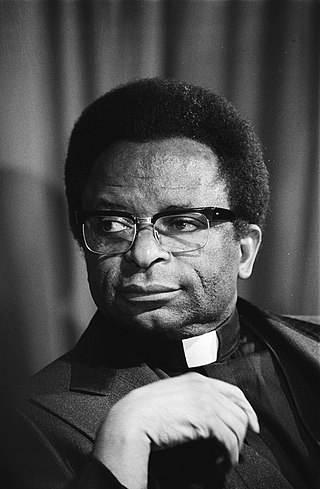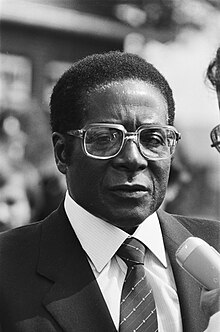
The politics of Zimbabwe occurs in a society deeply divided along lines of race, ethnicity, gender and geography. The ZANU–PF party has historically been dominant in Zimbabwe politics. The party, which was led by Robert Mugabe from 1980 to 2017, has used the powers of the state to intimidate, imprison and otherwise hobble political opposition in Zimbabwe, as well as use state funds and state media to advance the interests of the party.

Zimbabwe Rhodesia, alternatively known as Zimbabwe-Rhodesia, also informally known as Zimbabwe or Rhodesia, was a short-lived sovereign state that existed from 1 June 1979 to 18 April 1980, though lacked international recognition. Zimbabwe Rhodesia was preceded by another state named the Republic of Rhodesia and was briefly under a British-supervised transitional government sometimes referred to as a reestablished Southern Rhodesia, which according to British constitutional theory had remained the lawful government in the area after Unilateral Declaration of Independence (UDI) in 1965. About three months later, the re-established colony of Southern Rhodesia was granted internationally-recognized independence within the Commonwealth as the Republic of Zimbabwe.

The Zimbabwe African National Union – Patriotic Front (ZANU–PF) is a political organisation which has been the ruling party of Zimbabwe since independence in 1980. The party was led for many years under Robert Mugabe, first as prime minister with the Zimbabwe African National Union (ZANU) and then as president from 1987 after the merger with the Zimbabwe African People's Union (ZAPU) and retaining the name ZANU–PF, until 2017, when he was removed as leader.

Joice Runaida Mujuru, also known by her nom-de-guerre Teurai Ropa Nhongo, is a Zimbabwean revolutionary and politician who served as Vice-President of Zimbabwe from 2004 to 2014. Previously she had served as a government minister. She also served as Vice-President of ZANU–PF. She was married to Solomon Mujuru until his death in 2011 and was long considered a potential successor to President Robert Mugabe, but in 2014 she was denounced for allegedly plotting against Mugabe. As a result of the accusations against her, Mujuru lost both her post as Vice-President and her position in the party leadership. She was expelled from the party a few months later, after which she formed the new Zimbabwe People First party.

Parliamentary elections were held in Zimbabwe on 31 March 2005 to elect members to the Zimbabwe House of Assembly. All of the 120 elected seats in the 150-seat House of Assembly were up for election. There were a further 20 members appointed by the President and ten elected by traditional chiefs, who mostly support the government. Electoral colleges for the election of the ten chiefs to the parliament were to be held on 8 April.

Rhodesia had limited democracy in the sense that it had the Westminster parliamentary system with multiple political parties contesting the seats in parliament, but as the voting was dominated by the White settler minority, and Black Africans only had a minority level of representation at that time, it was regarded internationally as a racist country.
Gibson Jama Sibanda was a Zimbabwean politician and trade unionist. He was a founding member of the Movement for Democratic Change and at the time of his death was the Vice-President of the faction of the Movement for Democratic Change led by Arthur Mutambara. A former president of the Zimbabwe Congress of Trade Unions, he was first elected to the House of Assembly in the 2000 parliamentary election. He was a member of the Senate and a Minister of State in the Office of Deputy Prime Minister Arthur Mutambara at the time of his death in 2010.

General elections were held in Rhodesia in April 1979, the first where the majority black population elected the majority of seats in parliament. The elections were held following the Internal Settlement negotiated by the Rhodesian Front government of Ian Smith and were intended to provide a peaceful transition to majority rule on terms not harmful to White Rhodesians. In accordance with the Internal Settlement, on 1 June, Rhodesia officially became the nation of Zimbabwe Rhodesia, under the government of the United African National Council elected in the 1979 elections. The Internal Settlement was not approved internationally but the incoming government under Bishop Abel Muzorewa did decide to participate in the Lancaster House talks which led to the end of the dispute and the creation of Zimbabwe.

Parliamentary elections were held in Zimbabwe in June and July 1985. The result was a victory for the ruling ZANU–PF party led by Robert Mugabe, which increased its majority in parliament.

General elections were held in Southern Rhodesia between 14 February and 4 March 1980 to elect the members of the House of Assembly of the first Parliament of the independent Zimbabwe. As stipulated by the new Constitution of Zimbabwe produced by the Lancaster House Conference, the new House of Assembly was to comprise 100 members, 80 of whom would be elected proportionally by province by all adult citizens on a common role, and 20 of whom would be elected in single-member constituencies by whites on a separate roll.
Lovemore Moyo is a Zimbabwean politician who was Speaker of the House of Assembly of Zimbabwe from 2008 to 2013. He was the National Chairman of the Movement for Democratic Change – Tsvangirai (MDC-T) party led by Morgan Tsvangirai from 2006 to 2018.

David Coltart is a Zimbabwean lawyer, Christian leader and politician. He was a founding member of the Movement for Democratic Change when it was established in 1999 and its founding secretary for legal affairs. He was the Member of Parliament for Bulawayo South in the House of Assembly from 2000 to 2008, and he was elected to the Senate in 2008. He was the Minister for Education, Sport, Arts and Culture from February 2009 until August 2013. He is a top official of the Citizens Coalition for Change political party which was formed in 2022.
Ambrose Mutinhiri is a Zimbabwean politician, formally served as the Minister of Youth Development and Employment Creation. A retired army commander and brigadier, he was appointed as Minister of Youth Development, Gender and Employment Creation on February 9, 2004. He was trained in Russia during the Rhodesian Bush War. He is known for training the best calibre of soldiers during this period, even the late General Solomon Mujuru testified that he was trained by Mutinhiri.

The 7th Parliament of Zimbabwe was a meeting of the Zimbabwean Parliament, composed of the Senate and the House of Assembly. It met in Harare over five sessions from 25 August 2008 to 27 June 2013. Its membership was set by the disputed 2008 Zimbabwean general election, which resulted in a ZANU–PF majority in the Senate and Movement for Democratic Change – Tsvangirai control of the House of Assembly. Political negotiations resulted in the 2009 Government of National Unity, a coalition government composed of ZANU–PF, the MDC–T, and the MDC–M.
The Zimbabwe African People's Union – Federal Party is a minor Zimbabwean political party, based in Matabeleland. ZAPU-FP split from Agrippa Madlela's ZAPU party, purportedly a revival of those members of ZAPU who had rejected the 1987 merger with ZANU-PF in January 2002, following attempts by a faction of ZAPU led by Agrippa Madlela not to contest the Zimbabwean presidential election, 2002 a ZAPU founder Paul Siwela, was seconded to run as ZAPU's presidential candidate but was blocked by Aggripa Madlela's faction which itself was accused of accepting payments from the MDC which feared that ZAPU's participation in the election would split the anti-Mugabe vote in Matabeleland.

The modern political history of Zimbabwe starts with the arrival of white people to what was dubbed Southern Rhodesia in the 1890s. The country was initially run by an administrator appointed by the British South Africa Company. The prime ministerial role was first created in October 1923, when the country achieved responsible government, with Sir Charles Coghlan as its first Premier. The third Premier, George Mitchell, renamed the post Prime Minister in 1933.
Ronald Takawira Douglas Sadomba was a Rhodesian politician who served in the House of Assembly from 1970 to 1979. In 1979, he served in the Parliament of the short-lived Rhodesian successor state, Zimbabwe Rhodesia, prior to Zimbabwe's independence. He entered politics as a member of the Centre Party, and changed parties several times, joining throughout his career the African National Council, the United African National Council, ZANU–PF, and United Parties.
Elections were held in Zimbabwe on 31 July 2013 for the presidency and to set the membership of Parliament, consisting of the Senate and National Assembly. Robert Mugabe of the Zimbabwe African National Union – Patriotic Front (ZANU–PF) was reelected President with 61% of the vote against his main contender, Morgan Tsvangirai of the Movement for Democratic Change – Tsvangirai (MDC–T), who received 34%. ZANU–PF won large majorities in both houses of Parliament.

Callistus Dingiswayo Ndlovu was a Zimbabwean academic, diplomat, and politician. He joined the Zimbabwe African People's Union (ZAPU) in 1963 as a teacher in Matabeleland, and went on to serve as its representative to the United Nations and North America in the 1970s. After Zimbabwe's independence in 1980, he was a member of the House of Assembly from 1980 to 1985 and served as a senator from 1985 to 1990. He left ZAPU and joined the ruling ZANU–PF party in 1984.










